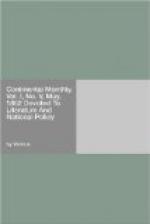In all directions, in the educational world, we are struck with the feeling and expression of a great need, though the questions as to just what it is, and just how to be met, have not been so distinctly answered. Let us agree with Mr. Currie, that ’Practical teaching can not be learned from books, even from the most exact “photographing” of lessons: it must be learned, like any other art or profession, by imitation of good models, and by practice under the eye of a master.’ Yet it is true, however paradoxical the statement may appear, that practical teaching will gain quite as much when the school-books shall have been cast into the right form and method, as when all the teachers shall have been obliged to imitate good models, in a system of sound normal and model schools. What has given to the teaching of geometry its comparatively high educating value through centuries, and in the hands of teachers of every bent, caliber, and culture? What but the well-nigh inevitable, because highly perfected and crystalline method of one book—Euclid’s Elements? Doubtless we want ‘live’ men and women, and those trained to their work, to teach: quite as imperatively we then want the right kind of text-books, in the pupils’ hands, with which to carry forward their common work. If mind is the animating spirit, and knowledge the shapeless matter, still method—and to the pupil largely the method of the books—is the organizing force or form under which the knowledge is to be organized, made available and valuable. We shall suffer quite as much from any lack of the best form, as through lack of the best matter, or of the most earnest spirit. In education, the teacher is the fluent element, full of present resources; the book should be the fixed element, always bringing back the discursive faculties to the rigid line of thought and purpose of the subject. We have now the fluent element in better forwardness and command than the fixed. We have much of the spirit; an almost overwhelming supply of the matter; but the ultimate and best form is yet largely wanting, and being so, it is now our most forcible and serious want.




